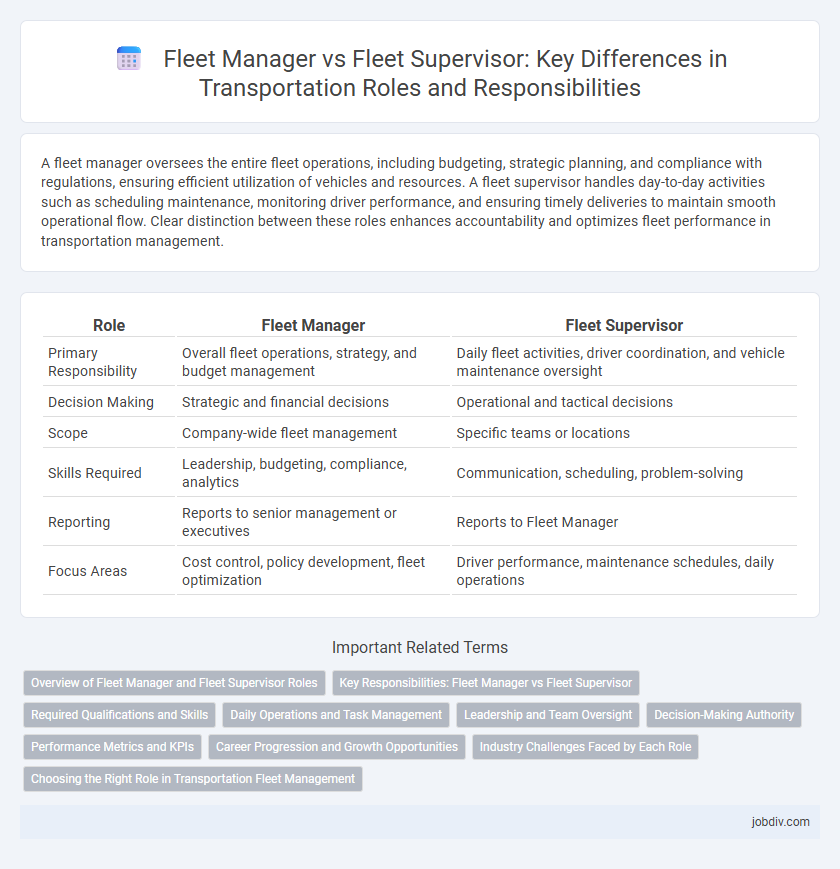A fleet manager oversees the entire fleet operations, including budgeting, strategic planning, and compliance with regulations, ensuring efficient utilization of vehicles and resources. A fleet supervisor handles day-to-day activities such as scheduling maintenance, monitoring driver performance, and ensuring timely deliveries to maintain smooth operational flow. Clear distinction between these roles enhances accountability and optimizes fleet performance in transportation management.
Table of Comparison
| Role | Fleet Manager | Fleet Supervisor |
|---|---|---|
| Primary Responsibility | Overall fleet operations, strategy, and budget management | Daily fleet activities, driver coordination, and vehicle maintenance oversight |
| Decision Making | Strategic and financial decisions | Operational and tactical decisions |
| Scope | Company-wide fleet management | Specific teams or locations |
| Skills Required | Leadership, budgeting, compliance, analytics | Communication, scheduling, problem-solving |
| Reporting | Reports to senior management or executives | Reports to Fleet Manager |
| Focus Areas | Cost control, policy development, fleet optimization | Driver performance, maintenance schedules, daily operations |
Overview of Fleet Manager and Fleet Supervisor Roles
Fleet Managers are responsible for overseeing the entire fleet operations, including vehicle acquisition, maintenance scheduling, and budget management, ensuring optimal utilization and compliance with transportation regulations. Fleet Supervisors handle day-to-day activities such as monitoring driver performance, coordinating vehicle dispatch, and addressing immediate operational issues to maintain smooth fleet functionality. Both roles are crucial for efficient fleet management, with managers focusing on strategic planning and supervisors on tactical execution.
Key Responsibilities: Fleet Manager vs Fleet Supervisor
Fleet Managers oversee strategic planning, budgeting, and overall fleet performance optimization, ensuring cost efficiency and regulatory compliance. Fleet Supervisors handle daily operations, including vehicle maintenance scheduling, driver coordination, and real-time issue resolution. Both roles collaborate to maintain safety standards and enhance fleet productivity, but Managers focus on long-term objectives while Supervisors manage immediate operational tasks.
Required Qualifications and Skills
Fleet Managers require strategic leadership skills, advanced knowledge of logistics software, and a degree in business administration or supply chain management, emphasizing budget control and compliance expertise. Fleet Supervisors need strong operational skills, hands-on experience in vehicle maintenance coordination, and certifications such as CDL or OSHA safety training, prioritizing day-to-day fleet activities. The distinction lies in Fleet Managers overseeing high-level planning and financial management, while Fleet Supervisors focus on tactical execution and workforce supervision.
Daily Operations and Task Management
Fleet Managers oversee overall strategy, budget allocation, and compliance, ensuring efficient fleet operations through data analysis and long-term planning. Fleet Supervisors focus on daily task management, coordinating driver schedules, vehicle maintenance, and real-time problem-solving to maintain operational flow. Both roles collaborate closely to optimize vehicle utilization, safety protocols, and regulatory adherence in transportation management.
Leadership and Team Oversight
Fleet Managers hold strategic leadership roles, overseeing overall fleet operations, budgeting, and compliance to ensure optimal performance and cost efficiency. Fleet Supervisors focus on direct team oversight, managing daily driver schedules, vehicle maintenance coordination, and enforcing safety protocols on the ground. Effective fleet management requires balancing high-level planning with frontline supervision to maintain operational excellence and team productivity.
Decision-Making Authority
A Fleet Manager holds higher decision-making authority, overseeing strategic planning, budget allocation, and policy development for entire fleet operations. In contrast, a Fleet Supervisor focuses on day-to-day operational decisions, managing vehicle scheduling, driver assignments, and compliance monitoring. Effective fleet management relies on clear delineation of decision-making roles to optimize resource utilization and ensure regulatory adherence.
Performance Metrics and KPIs
Fleet Managers prioritize strategic performance metrics such as fleet utilization rate, total cost of ownership, and driver compliance scores to optimize long-term operational efficiency. Fleet Supervisors focus on real-time KPIs including vehicle maintenance adherence, fuel consumption per trip, and driver behavior incidents to ensure daily operational effectiveness. Both roles leverage data analytics tools to monitor and improve fleet safety, productivity, and cost management within transportation operations.
Career Progression and Growth Opportunities
Fleet Managers oversee comprehensive fleet operations, including strategic planning, budgeting, and compliance, positioning them for higher executive roles such as Logistics Director or Operations Manager. Fleet Supervisors focus on daily team management, vehicle maintenance coordination, and crew scheduling, serving as a critical step for developing leadership skills before advancing to management positions. Career progression typically moves from Fleet Supervisor to Fleet Manager, with growth opportunities expanding through certifications like Certified Transportation Professional (CTP) and advanced degrees in supply chain management.
Industry Challenges Faced by Each Role
Fleet Managers confront challenges such as strategic route planning, compliance with transportation regulations, and optimizing fleet utilization to reduce operational costs. Fleet Supervisors face day-to-day hurdles including vehicle maintenance scheduling, driver performance monitoring, and immediate issue resolution on the ground. Both roles must navigate evolving industry demands like rising fuel prices, technological integration, and safety standards enforcement.
Choosing the Right Role in Transportation Fleet Management
Selecting the right role in transportation fleet management depends on operational scope and leadership responsibilities versus hands-on coordination. Fleet Managers focus on strategic planning, budget oversight, and performance optimization across the entire fleet, making data-driven decisions to improve efficiency and compliance. Fleet Supervisors concentrate on day-to-day operations, driver supervision, and vehicle maintenance coordination, ensuring smooth and safe fleet functionality on the ground.
Fleet Manager vs Fleet Supervisor Infographic

 jobdiv.com
jobdiv.com